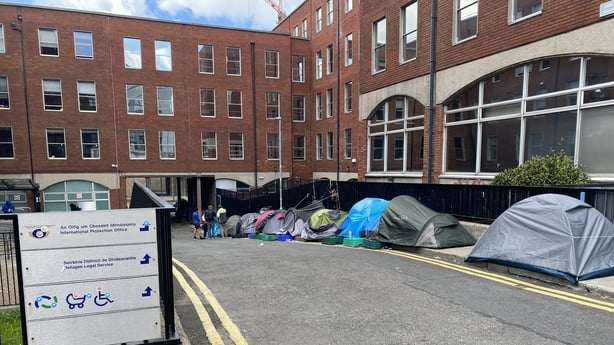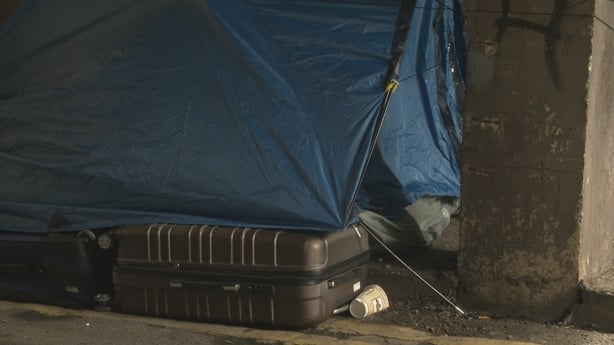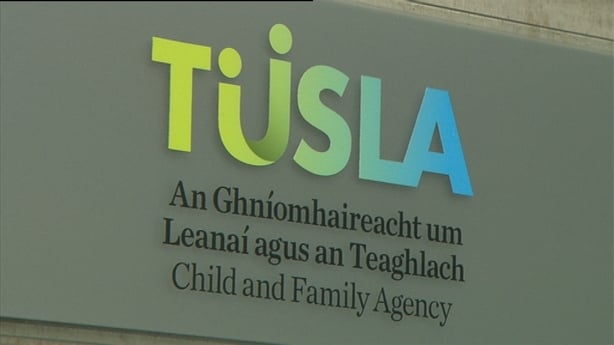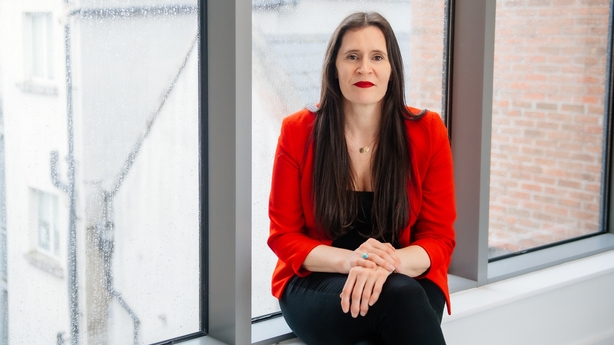The accommodation crisis for people seeking international protection has been described as "a new low" in the history of refugee protection in Ireland, according to the Irish Refugee Council.
A report by the charity outlined the escalation of homelessness over the past five months, resulting in hundreds being forced to sleep rough.
In January, the Government paused taking people into the Citywest transit hub, which resulted in more than 1,300 people, who arrived seeking international protection, not having an offer of accommodation on arrival.
In its latest report, the IRC outlined their experiences of sleeping on the streets, in fear of their safety, with little guidance about where to go or what to do.
Despite warnings late last year and early this year, the charity said Government departments did not prepare adequately for the situation.
It has called for an all-of-government response to the crisis and greater inter-departmental cooperation and communication.
International Protection Applicants are not included in monthly homeless figures published by the Department of Housing for those in emergency accommodation.
The IRC said the decision to respond to two groups of people experiencing homelessness with different policies, on the grounds of their different status or nationality, risks being discriminatory and not tenable.
In April, a High Court judgment declared that the failure to provide adequate reception conditions to an applicant was unlawful and a breach of the Charter of Fundamental Rights of the European Union.
We need your consent to load this rte-player contentWe use rte-player to manage extra content that can set cookies on your device and collect data about your activity. Please review their details and accept them to load the content.Manage Preferences
In this latest report, the IRC described the accommodation crisis for those seeking international protection in Ireland as not only a loss of dignity, but "destitution" among those forced into homelessness.
The worst point was when 593 people who came seeking international protection experienced homelessness.
Many of those presenting at the International Protection Office were mentally and physically exhausted, with health conditions pre-dating arrival in Ireland and exacerbated because of being forced to sleep rough.
The number of people in that situation surpassed 12,000 for the first time in April.

'Immensely vulnerable situation'
The report, entitled 'Now I Live On The Road', said 61 people seeking protection are currently homeless.
The report stated that government departments (including Justice, Housing, Social Protection, Health and the Department of Children, Education, Disability, Integration and Youth), failed to plan accordingly or develop safeguards to ensure fundamental rights of people seeking protection were being met.
It also stated that safeguards were not put in place to ensure vulnerable people stayed off the street, including unaccompanied children.
The IRC is supporting four unaccompanied children who were forced to rough sleep after being assessed as "ineligible for State childcare services".
One child was forced to rough sleep for five weeks before he received an original ID in the post from his family and submitted it to the International Protection Office.
He was then forced to rough sleep for a further week before being taken into Tusla care.
The report said he primarily slept at bus and train stations along with some other people seeking protection whom he met in Ireland.
He told his IRC caseworker that he was afraid to go to a garda station for shelter because of negative experiences with police when travelling from his country of origin.
On 12 March, the IRC made a request to the Government that anyone who presents as a minor and is not taken into care by Tusla should be accommodated by International Protection Accommodation Services.
"An unaccompanied child forced to sleep rough is in an immensely vulnerable situation," it said.
"As well as risks to physical and mental health, there are significant threats to the child's safety."
'I was given no information on supports, just a gift card'
The report also outlined the experiences of adults, with whom the Refugee Council has worked, including Ali who was forced to rough sleep for 56 days.
When asked about his experience of applying for international protection in February, he said: "I told them I am new here, I don't know anyone.
"They asked me where I slept last night. They told me that if I don't have any other accommodation, I will be on the street."
Around nine weeks into the crisis, at the end of March, people seeking protection experiencing homelessness were given access to a weekly payment of €38.80.
Before this policy was announced, they were eligible to apply for an Additional Needs Payment, but many applicants were still left destitute according to the report.
When Ali applied for international protection, he did not have access to a weekly payment, which left him entirely reliant on his €25 Dunnes Stores voucher and the Capuchin Day Centre.
"I was given no information on supports, just a gift card [for Dunnes Stores]," he said.
"A woman I met on the street directed me to the Irish Refugee Council. They told me about homeless charities.
"That’s how I found the Capuchin Centre. I went there every day for food."

Ali did not know he was eligible to apply for Additional Needs Payment.
When he attended an Intreo centre to collect his PPSN, he asked about State supports: "I asked about applying for funds, they told me I needed proof of address to get any funds."
Some of the men who are quoted in the report also noted the danger they have faced on the streets.
Mike was assaulted on the street: "In night, I was being harassed and beaten up by some guys. There is nothing I could do."
Khan also experienced harassment: "They threw water [at us]; many times they also punching and this kind of things, so we run from them."
Ali was later moved to Citywest: "It’s like a prison. I sleep on steel chairs or on the floor. The food is not good."
It is clear from the report that non-governmental organisations (NGOs) on the front line have bourne the brunt of the pressure because of the crisis in accommodation.
It adds that the slow Government response led to an overreliance on NGOs to meet the urgent needs of people seeking protection.
As a result, many NGOs and homeless services were inundated by the uptake in demand.
Staff at the Capuchin Day Centre expressed disappointment by the lack of support offered to them by the Government, given the increase in demand for their service.
Despite being warned by the Government to expect an increase in demand, and people being directed to the Day Centre by IPAS, they were not offered additional funding.
Since 1 January, the day centre has distributed 145 sleeping bags and 84 tents at a total cost of €11,405.
'Complete lack of clarity'
Staff at the Mendicity charity also felt there was "a complete lack of clarity" on the situation, and that guidance from the Government was "vague".
The charity, which is one of Dublin's oldest, called for "improvements in the pack received on arrival", such as the inclusion of "a map of Dublin, a Leap card, contact details for a Community Welfare Officer".
The report said it is imperative that, at a minimum, homelessness among people seeking protection ceases and does not reoccur.
It called for measures to be taken to alleviate destitution if people remain homeless and the Refugee Council makes short-, medium- and long-term recommendations to address the accommodation crisis.
It suggested an all-of-government response to the crisis and greater inter-departmental cooperation and communication.
It called for a full social welfare allowance to alleviate destitution until reception conditions can be met.
The Refugee Council also suggested that applicants be given the option of pausing their protection application until they are provided with accommodation.
It recommended that the Government identify a point of contact whose priority is to ensure proactive communication with relevant NGOs, should crises of this nature reoccur.
It also recommended that all people seeking protection to be assessed for vulnerabilities, as required by law.
CEO of the Irish Refugee Council Nick Henderson called on the Government to fulfil its duties to provide reception conditions.
"Unless this occurs, for the foreseeable future, a single male protection applicant who arrives in Ireland is likely to face a period of homelessness," Mr Henderson said.
"We are extremely concerned that safeguards have not been put in place to identify vulnerable people, including unaccompanied children, pregnant women, and people with serious mental and physical health concerns."
He later added that the situation of "the four children that we've worked with, is the most acute and most disturbing feature of a very significant and serious crisis".

Significant increase in number of unaccompanied children seeking International Protection
Tusla has said that there has been a significant increase in the number of Separated Children Seeking International Protection and Unaccompanied Minors presenting to or being referred to the Child and Family Agency over the last 12 months.
In 2022, 597 referrals to the service were received (excluding 're-referrals').
This marked an increase of approximately 500% on 2021, where there were 152 referrals in total.
The figures for 2023, to date, are projected to show further increases on 2022 data according to a spokesperson.
Tusla said: "Our Separated Children Seeking International Protection team provides valuable support to these most vulnerable children/young people from various countries who come to Ireland for safety, refuge, and better quality of life.
"The team also has a dedicated aftercare service to meet the unique needs of separated children as they leave care and support them with their transition into adulthood and independence in Ireland."
Asked why children would be assessed as "ineligible for State childcare services", as was noted in the Refugee Council report, Tusla said that since 2021, work has been on-going to strengthen its procedure for the assessment of eligibility for services under the Child Care Act 1991.
In instances where an international protection applicant that arrives in Ireland either appears to not yet be an adult and is unaccompanied, or where an applicant states that they are an unaccompanied minor, the applicant is referred to Tusla either by the Garda National Immigration Bureau (GNIB) at the airport/port of entry, or by staff at the International Protection Office (IPO) of the Department of Justice.
Under the International Protection Act an assessment is carried out by Tusla Social Workers to assess the eligibility of the applicant to determine if the individual is eligible for services because they are a child.
Tusla has acknowledged that this is a "subjective process", particularly where no documentary evidence, or medical evidence, has been made available to Tusla staff to assist staff in determining eligibility for services, with a consequential risk of adults being placed in children’s services, or children being placed in adult services.
It has said that strengthening procedure for the assessment of eligibility for services includes "improving the level and accessibility of information provided to the young person, the availability of legal representation, an advocate or interpreter as required, and the introduction of an appeals process (if a young person is not satisfied with the outcome of the assessment, there is an appeals process, independent of the assessing team). We also promote the benefit of doubt principle, in decision-making."

Irish Human Rights and Equality Commission
The Chief Commissioner of the Irish Human Rights and Equality Commission has said people seeking International Protection have also been presenting at IHREC offices in Dublin.
Sinéad Gibney said those who are arriving are tired, hungry and are outlining experiences where their dignity is being "completely eroded".
Ms Gibney welcomed the fall in the number of homeless people seeking international protection, and commended the Department of Children for the work it has done, however, she said a reversal of policy was required.
"The reality is that people are presenting here seeking international protection and are being refused beds and that continues and that must reverse, they have to simply change that policy and provide accommodation for people," she said.
On the issue of unaccompanied minors sleeping rough, the Chief Commissioner was limited in what she could say due to ongoing litigation by IHREC regarding minors, however she said it was of huge concern for the Commission.
"I think it speaks to a system that we've been calling for, which is a fully integrated future proofed stable system for international protection, which allows for the different situations that people present when they arrive here, for example, that it should be trauma informed, it should be about assessing vulnerabilities effectively, identifying when it really is the case that, for example, people who may be pregnant should not be experiencing homelessness, nobody should be," she said.
IHREC is calling for a fit for purpose system that "fits into Ireland's state infrastructure".






